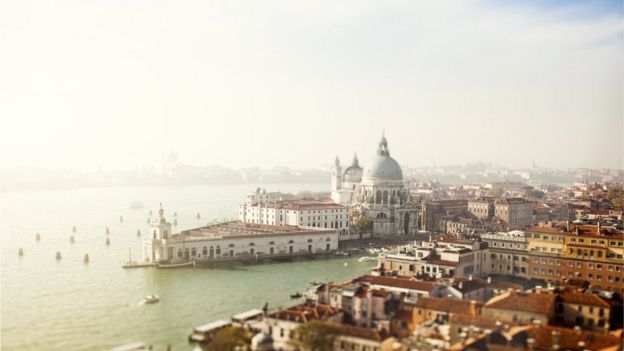2016 has been a momentous year. The UK's vote to leave the European Union and the election of Donald Trump confounded expectations, while the wars in Syria and Yemen caused more bloodshed. BBC Radio 4's Today programme asked top historians which year in history 2016 most resembled. Margaret MacMillan is reluctantly reminded of 1914...
Margaret MacMillan: The echoes of 1914
By Margaret MacMillan, Historian
BBC News
19 December 2016

The events of 1914 were eventually overshadowed by the outbreak of World War One
2016 has been a momentous year. The UK's vote to leave the European Union and the election of Donald Trump confounded expectations, while the wars in Syria and Yemen caused more bloodshed. BBC Radio 4's Today programme asked top historians which year in history 2016 most resembled. Margaret MacMillan is reluctantly reminded of 1914.
History does not neatly repeat itself but, oh, there are so often echoes and rhymes.
Some years - and it always depends a bit on who and where you are - slide by without fuss, unremarked.
Others - 1939, 1989, or going further back the 1789 of the French Revolution - do stick in our memories as earthquakes do.
So what is 2016 and what might it remind us of?

Herbert Asquith (front row, second from left) was British prime minister in 1914
I wish I could stop, but I find myself thinking of 1914.
The world then had seemed so stable, so manageable.
Crises - political, social, economic, military - came and went but "they", bankers, statesmen, politicians, always managed them in the end.
Yes, there were grumblings - from the working classes or women, or those who were losing their livelihoods because of free trade or mechanisation.

George Bernard Shaw's Pygmalion had its debut on the London stage in April 1914
And there were some strong emotions about: fears of rapid change, passionate nationalisms that meant love of one's own country and hatred of others.
Ominous in retrospect because we know what happened. But at the time there was a complacency - it would surely all work out all right.
That confidence was dangerous because it meant that people didn't take the warning signs seriously enough.
I wish I could stop making the comparisons.
Events of 1914

Before the outbreak of war eclipsed all other events, there were a few interesting moments - the first colour feature film was shown in the UK in April, and George Bernard Shaw's play Pygmalion had its London debut
In Parliament, the dominant issue for much of the year was how home rule in Ireland would work
Archduke Franz Ferdinand was assassinated on 28 June, triggering a series of reactions that would provoke World War One
Britain declared war on Germany on 4 August. The day before, Foreign Secretary Sir Edward Grey declared: "The lamps are going out all over Europe; we shall not see them lit again in our lifetime."
Margaret MacMillan is the Warden of St Antony's College and a professor of international history at the University of Oxford.
Margaret MacMillan: The echoes of 1914 - BBC News
Margaret MacMillan: The echoes of 1914
By Margaret MacMillan, Historian
BBC News
19 December 2016

The events of 1914 were eventually overshadowed by the outbreak of World War One
2016 has been a momentous year. The UK's vote to leave the European Union and the election of Donald Trump confounded expectations, while the wars in Syria and Yemen caused more bloodshed. BBC Radio 4's Today programme asked top historians which year in history 2016 most resembled. Margaret MacMillan is reluctantly reminded of 1914.
History does not neatly repeat itself but, oh, there are so often echoes and rhymes.
Some years - and it always depends a bit on who and where you are - slide by without fuss, unremarked.
Others - 1939, 1989, or going further back the 1789 of the French Revolution - do stick in our memories as earthquakes do.
So what is 2016 and what might it remind us of?

Herbert Asquith (front row, second from left) was British prime minister in 1914
I wish I could stop, but I find myself thinking of 1914.
The world then had seemed so stable, so manageable.
Crises - political, social, economic, military - came and went but "they", bankers, statesmen, politicians, always managed them in the end.
Yes, there were grumblings - from the working classes or women, or those who were losing their livelihoods because of free trade or mechanisation.

George Bernard Shaw's Pygmalion had its debut on the London stage in April 1914
And there were some strong emotions about: fears of rapid change, passionate nationalisms that meant love of one's own country and hatred of others.
Ominous in retrospect because we know what happened. But at the time there was a complacency - it would surely all work out all right.
That confidence was dangerous because it meant that people didn't take the warning signs seriously enough.
I wish I could stop making the comparisons.
Events of 1914

Before the outbreak of war eclipsed all other events, there were a few interesting moments - the first colour feature film was shown in the UK in April, and George Bernard Shaw's play Pygmalion had its London debut
In Parliament, the dominant issue for much of the year was how home rule in Ireland would work
Archduke Franz Ferdinand was assassinated on 28 June, triggering a series of reactions that would provoke World War One
Britain declared war on Germany on 4 August. The day before, Foreign Secretary Sir Edward Grey declared: "The lamps are going out all over Europe; we shall not see them lit again in our lifetime."
Margaret MacMillan is the Warden of St Antony's College and a professor of international history at the University of Oxford.
Margaret MacMillan: The echoes of 1914 - BBC News














